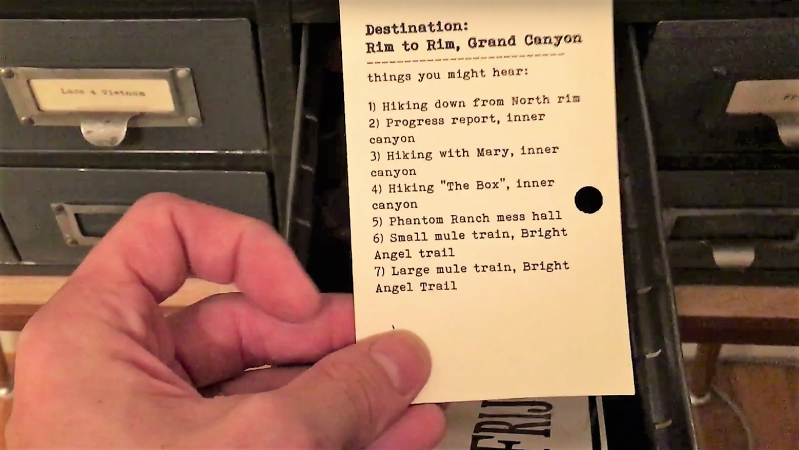Some people collect stamps, some collect barbed wire, and some people even collect little bits of silicon and plastic. But the charmingly named [videoschmideo] collects memories, mostly of his travels around the world with his wife. Trinkets and treasures are easy to keep track of, but he found that storing the audio clips he collects a bit more challenging. Until he built this audio memory chest, that is.
Granted, you might not be a collector of something as intangible as audio files, and even if you are, it seems like Google Drive or Dropbox might be the more sensible place to store them. But the sensible way isn’t always the best way, and we really like this idea. Starting with what looks like an old card catalog file — hands up if you’ve ever greedily eyed a defunct card catalog in a library and wondered if it would fit in your shop for parts storage — [videoschmideo] outfitted 16 drawers with sensors to detect when they’re opened. Two of the drawers were replaced by speaker grilles, and an SD card stores all the audio files. When a drawer is opened, a random clip from that memory is played while you look through the seashells, postcards, and what-have-yous. Extra points for using an old-school typewriter for the drawer labels, and for using old card catalog cards for the playlists.
This is a simple idea, but a powerful one, and we really like the execution here. This one manages to simultaneously put us in the mood for some world travel and a trip to a real library.
















It is strange to think that the card catalogs and microfiche are no longer a thing at libraries.
Not that I have the room but an old card catalog would sure stimulate some nostalgia whatever purpose I put it to.
By the time my wife was a librarian in the late 90s I think they had already been taken out of service because of the effort required to maintain the cards vs the ease of using the computer.
I lived in rural northwestern New Jersey as a child in the 90’s, and many of the old town and school libraries still used card catalogs. One of a handful of things I appreciated about living in the sticks, at least for nostalgia’s sake.
Had a bit of a weird thing go on at one university library back in the day, cards and computer persisted in parallel for a number of years. The deal was that the minicomputers were all clustered, and there wasn’t a MIP that the computational organic chemistry bods couldn’t soak up with some simulation or other.. soooo… online library catalog access was often doggier than dog slow, and the card index more convenient. Mitigation happened as I was leaving, in the form of a PC network clustered to a dedicated IBM box instead, with the catalog on that, then also at the same time those computational chemistry guys were finding they could run the same crap more conveniently and almost as fast as a multiprocessor vax cluster, on their shiny new desktop Pentium 166s
My college library still has microfiche…
i used to type library catalog cards. Not fun.
Speaking of memories, I’ve done everything that is on that list in the title picture. Great times on that trip 15 years ago….
Nice. How is Mary?
I see what you did there…….
What? You don’t have a Mary? I feel gulled.
There’s something about Mary…
For a second, I thought the one item said “smell mule train” and that brought back a memory from a rim-to-rim hike several years ago.
” Google Drive or Dropbox might be the more sensible place to store them.”
Umm, no, espically for a traveler where you may not have a fast or any data connection at all.
Well, unless I missed something…as a traveler, how would have access to his card catalog desk which is at his home?
This seems like something that could be in a spooky computer game where you have to wander around a house finding clues. :-S
Could be? I’m sure it’s a primitive in ScummVM :-D